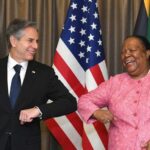Kuanzia ikulu za rais hadi mahakama za kimataifa, Viongozi wa kisiasa wanawake wa Kiafrika wanaunda mustakabali mpya wa bara hili. Safari yao—kutoka uanaharakati wa mashinani wa Winnie Byanyima hadi diplomasia ya kimataifa ya Amina Mohammed—inathibitisha kwamba uongozi unafafanuliwa upya kwa kiasi kikubwa. Hii ni hadithi ya akina mama wa harakati, wanadiplomasia, na wavurugaji vijana ambao sio tu kuvunja dari bali kujenga misingi mipya.
Trailblazers: Wamama wa Harakati na Utawala
Kabla ya kuangaziwa na vyombo vya habari vya kimataifa, kulikuwa na wanawake kama Graca Machel, ambaye alitembea pamoja na wapigania ukombozi nchini Msumbiji, akihatarisha maisha yake ili kuwakomboa watu wake kutoka kwa utawala wa kikoloni. Walakini, hadithi yake haikuishia na uhuru. Alijizua upya kama mtetezi wa haki za watoto na elimu, na kuwa mojawapo ya sauti zinazoheshimika sana za maadili katika duru za sera za kimataifa.
Safari yake inaakisi ile ya wanawake wengi wa Kiafrika: kuanzia katika vivuli vya upinzani na kukua katika uongozi wa kimataifa. Wanatukumbusha kwamba mamlaka ya kisiasa barani Afrika kamwe hayakukabidhiwa tu yalipiganiwa, na wanawake walikuwa mstari wa mbele. Nchini Ghana, Nana Konadu Agyeman-Rawlings alivunja vikwazo katika miaka ya 1980, na kuwa mke wa rais wa nchi hiyo kuwa na ushawishi wa kisiasa zaidi ya majukumu ya sherehe. Kupitia NGO yake, Vuguvugu la Wanawake la Desemba 31, alihamasisha maelfu ya wanawake, kupata huduma bora za afya, kusoma na kuandika, na uwezeshaji wa kiuchumi wakati ambapo "siasa" ilizingatiwa kuwa hifadhi ya wanaume pekee. Jaribio la kuthubutu la Konadu kugombea urais baadaye lilimtia nguvu kama mfuatiliaji ambaye alithibitisha kuwa wanawake hawakuweza tu kuunga mkono siasa wangeweza kuiongoza.
Wanadiplomasia na Walinzi wa Haki
Ikiwa Machel na Konadu walionyesha uanaharakati wa chinichini, wengine kama Fatou Bensouda walijumuisha ushawishi wa Afrika katika haki ya kimataifa. Mzaliwa wa Gambia, alipandishwa cheo na kuwa Mwendesha Mashtaka Mkuu katika Mahakama ya Kimataifa ya Uhalifu (ICC) nafasi ambayo ilimweka katikati ya baadhi ya kesi zenye mashtaka mengi zaidi ya kisiasa duniani. Katika vyumba vya mahakama vilivyo maelfu ya maili kutoka nyumbani kwake, alibeba uzito wa matumaini ya wahasiriwa kwa haki. Hadithi yake ni ukumbusho kwamba wanawake wa Kiafrika wanaunda sio tu siasa za kitaifa lakini pia sheria za kimataifa.
Kando na mamlaka tulivu ya Bensouda, watu kama Amina Mohammed wa Nigeria wamefafanua upya diplomasia. Akiwa Naibu Katibu Mkuu wa Umoja wa Mataifa, Mohammed amekuwa na mchango mkubwa katika kuendeleza Malengo ya Maendeleo Endelevu, akiwakilisha Afrika si kama bara la mahitaji, bali kama bara la maono. Jukumu lake linaangazia jinsi wanawake wa Kiafrika wanavyozidi kuwa katika uhusiano wa kufanya maamuzi duniani.
Ngozi Okonjo-Iweala – The Global Voice
Mbali na ikulu za rais, mwanamke mwingine Mwafrika anashikilia mojawapo ya viti vyenye ushawishi mkubwa katika uchumi wa dunia. Ngozi Okonjo-Iweala, waziri wa zamani wa fedha wa Nigeŕia, sasa ni Mkurugenzi Mkuu wa Shiŕika la Biashaŕa Ulimwenguni mwanamke wa kwanza na Mwafrika wa kwanza kufanya hivyo.
Hadithi yake imezama kwenye mchanga. Kuanzia kuiongoza Nigeria kupitia mizozo ya madeni hadi kupambana na rushwa iliyokita mizizi, alijijengea sifa ya uadilifu bila woga. Leo, anatetea sheria za haki za biashara ya kimataifa na usawa wa chanjo, kuhakikisha sauti ya Afrika haiwezi kutengwa katika jukwaa la dunia.
Sahle-Work Zewde - Alama ya Kuunganisha ya Ethiopia
Nchini Ethiopia, ambapo mivutano ya kikabila mara nyingi hufafanua siasa, uteuzi wa Sahle-Work Zewde kama rais wa kwanza mwanamke nchini humo ulikuwa zaidi ya sherehe. Mwanadiplomasia wa kazi, alibeba uzoefu wake wa miongo kadhaa kutoka Umoja wa Mataifa na sifa ya utulivu lakini thabiti wa serikali.
Sahle-Work ametumia jukwaa lake kutetea amani, usawa wa kijinsia, na upatikanaji wa elimu kwa wasichana. Hadithi yake inaonyesha nguvu ya diplomasia, ikionyesha kwamba uongozi hauji kila mara kwa ngumi iliyokunjwa, lakini mara nyingi kwa mkono uliotulia ulionyoshwa kwenye migawanyiko.
Bogolo Kenewendo - The Young Disruptor
Ikiwa kizazi cha wazee cha viongozi kilivunja vikwazo, wale wadogo wanavifafanua upya kabisa. Bogolo Kenewendo wa Botswana alikuwa na umri wa miaka 31 pekee alipokuwa Waziri wa Uwekezaji, Biashara na Viwanda wa nchi hiyo kuwa waziri mwenye umri mdogo zaidi katika historia ya Botswana.
Kuinuka kwake kulituma ujumbe wazi: mustakabali wa siasa za Kiafrika hautachongwa tu na wanaume walio na uzoefu wa miongo kadhaa bali pia na wanawake shupavu na wenye mawazo mapya. Leo, Kenewendo ni sauti inayoongoza katika mageuzi ya dijiti na mageuzi ya kiuchumi, ikithibitisha kuwa vijana na maono yanaweza kuwa sarafu za kisiasa zenye nguvu.
Phumzile Mlambo-Ngcuka – The Advocate
Phumzile Mlambo-Ngcuka wa Afrika Kusini ametumia muda mwingi wa maisha yake kupigania haki za wanawake. Akiwa Naibu Rais wa zamani wa Afrika Kusini na baadaye Mkurugenzi Mtendaji wa UN Women, alisisitiza sera za kimataifa kuhusu usawa wa kijinsia na uwezeshaji wa wanawake.
Safari yake inachanganya uanaharakati na utawala ikionyesha kwamba siasa sio tu kuhusu kushika wadhifa bali pia kubadilisha mfumo wa kijamii wa jamii. Utetezi wake unaendelea kuhamasisha kizazi cha viongozi wanawake wa Kiafrika ambao wanaona mamlaka ya kisiasa sio mwisho lakini kama chombo cha mabadiliko.
Madaraka ya Rais
Hadithi za Ellen Johnson Sirleaf wa Liberia na Samia Suluhu Hassan wa Tanzania ni matukio muhimu katika masimulizi ya kisiasa barani Afrika. Sirleaf, ambaye alirithi taifa lililoharibiwa na vita, alijulikana kama "Mwanamke wa Chuma wa Afrika," akiongoza Libeŕia kutoka kwenye vita vya wenyewe kwa wenyewe kuelekea amani tete. Urais wake ulithibitisha kwamba wanawake hawakuweza tu kushikilia wadhifa wa juu zaidi lakini kufanikiwa katika hilo, kupitia changamoto ambazo wengi walitilia shaka angeweza kuzishinda.
Kupanda kwa Samia Suluhu Hassan kunaleta mabadiliko sawa. Alipokuwa rais wa Tanzania mwaka 2021 baada ya kifo cha ghafla cha John Magufuli, wakosoaji walitilia shaka iwapo alikuwa na nguvu za kisiasa za kuongoza. Je, mwanamke mwenye sauti laini anaweza kushughulikia uzito wa uongozi wa kitaifa? Kwa njia yake mwenyewe tulivu lakini thabiti, Hassan alitengeneza upya simulizi hilo akitambulisha mtindo wa uongozi wa kidiplomasia zaidi na kuashiria mabadiliko kuelekea ushirikishwaji. Urais wake unaonyesha uwezo wa uongozi wa hila katika eneo ambalo mara nyingi huhusishwa na siasa kali.
Wabunge Wakivunja Daraja
Katika bara zima, wanawake wanafafanua upya jinsi ushiriki wa kisiasa unavyoonekana katika ngazi ya ubunge. Nchini Rwanda, wanawake wanashikilia 61% ya viti vya ubunge, idadi kubwa zaidi duniani. Hatua hii haikutokea kwa bahati mbaya; ilikuwa ni matokeo ya sera za makusudi, uhamasishaji wa watu mashinani, na utetezi usiochoka wa mashirika ya wanawake baada ya mauaji ya kimbari ya 1994. Leo, Rwanda ni mfano wa uchunguzi wa kimataifa kuhusu jinsi mageuzi ya kimuundo yanaweza kufungua sauti za wanawake katika utawala.
Nchini Afrika Kusini, Lindiwe Mazibuko alikua mwanamke mweusi mwenye umri mdogo zaidi kuongoza upinzani Bungeni. Ufasaha wake na ukosoaji mkali wa sera sio tu kwamba ulipinga chama tawala lakini pia ulitia moyo kizazi kipya cha wanawake vijana wa Kiafrika ambao wanaona uongozi wa kisiasa kama nafasi yao.
Winnie Byanyima: Daraja Kati ya Uanaharakati na Sera
Hakuna hadithi inayonasa hali ya kisiasa ya Afrika inayobadilika zaidi ya ile ya Winnie Byanyima. Mhandisi wa angani aliyefunzwa, aliacha starehe ya taaluma yake na kujiunga na upinzani dhidi ya udikteta wa Uganda. Uanaharakati wake hatimaye ulibadilika na kuwa siasa, kisha utetezi wa kimataifa. Leo, kama mkuu wa UNAIDS, anabeba wasiwasi wa bara hilo katika mijadala ya kimataifa kuhusu afya na ukosefu wa usawa.
Safari yake kutoka mitaani hadi Umoja wa Mataifa inawakilisha mfano: Wanawake wa Kiafrika hawafungiwi tena kwenye mipaka ya kitaifa. Wanaunda mijadala ambayo hurejea kutoka kwa mabaraza ya vijiji hadi mikutano ya kilele ya kimataifa.
Njia tofauti, Mapambano ya Pamoja
Kinachowaunganisha wanawake hawa si hadithi moja bali ni mapambano ya pamoja: kushinda ubaguzi wa kimfumo wa kijinsia, matarajio ya kitamaduni, na upinzani wa kisiasa. Wengi walivumilia kunyanyaswa, kufungwa gerezani, au kudhihakiwa. Wengine walidhabihu maisha ya kibinafsi kwa ajili ya utumishi wa umma. Walakini, kupitia uvumilivu,
walichonga nafasi ambazo hazikuwepo hapo awali.
Masimulizi yao hayaakisi matamanio ya kibinafsi tu bali maendeleo ya pamoja. Wanatukumbusha kuwa uongozi wa kisiasa hauhusu ishara ya kijinsia bali ni nguvu ya mitazamo tofauti katika kuunda jamii.
Kizazi Kijacho: Wanawake Vijana Kufafanua Upya Siasa za Kiafrika
Kuangalia mbele, swali si kama wanawake wa Kiafrika wataongoza ni jinsi gani wataunda awamu inayofuata ya utawala. Kwa zaidi ya 60% ya wakazi wa Afrika chini ya umri wa miaka 25, wanawake vijana wanaingia katika siasa, uanaharakati, na utetezi unaoendeshwa na teknolojia kwa idadi isiyo na kifani. Harakati za mitandao ya kijamii, kutoka Nigeria #EndSARS hadi maandamano ya Sudan, zimewaangazia wanawake vijana kama viongozi wa uhamasishaji.
Sauti hizi zinazoinuka zinasimama kwenye mabega ya Machel, Konadu, Bensouda, Sirleaf, Hassan,Byanyima, na wengine wengi. Hadithi zao zinaunda mwendelezo: kutoka kwa vuguvugu la ukombozi hadi ofisi za rais, kutoka kwa mabunge hadi mahakama za kimataifa.
Hitimisho: Mawazo Mpya ya Kisiasa
Mazingira ya kisiasa ya Afrika hayawezi kueleweka tena bila hadithi za wanawake wake. Sio tu kuvunja dari za glasi, wanaunda upya vyumba ambavyo maamuzi hufanywa. Kila mmoja hubeba sauti za mamilioni ya watu ambao hapo awali walinyamazishwa, na kila hadithi inatupa changamoto ya kuwazia mustakabali wa kisiasa ambapo uongozi haufafanuliwa kwa jinsia bali kwa maono, ujasiri, na huduma. Kuanzia mwanzo wa kimapinduzi wa Graça Machel hadi utetezi wa Winnie Byanyima duniani kote, kutoka katika nafasi ya urais wa Ellen Johnson Sirleaf hadi mageuzi ya kimyakimya ya Samia Suluhu Hassan, viongozi wa wanawake wa Afrika wanatukumbusha ukweli mmoja: wakati wanawake wanaongoza, mataifa yanahama, na dunia inasikiliza.
Machapisho yanayohusiana
-
Nguvu Kuu Zinashindana kwa Neema ya Afrika
Ghafla, Marekani, Urusi na Ufaransa zinatumia muda na juhudi kukuza urafiki wao wa Kiafrika…
-
Hadithi ya Siri Zilizotunzwa Bora za Afrika
Afrika ina historia tajiri na tata, lakini kuna ujinga ulioenea kuhusu urithi huu.…
-
Kutoka Sahara hadi Rasi: Safari za Barabarani za Kiafrika
Gundua njia za safari za kuvutia zaidi za Afrika kutoka Milima ya Atlas ya Morocco hadi Cape ya Afrika Kusini...


